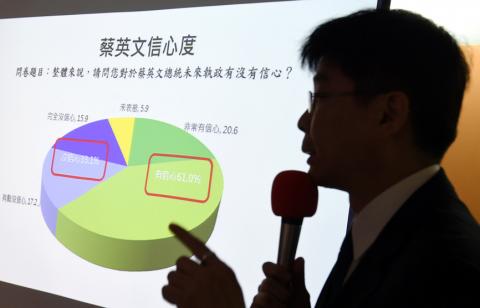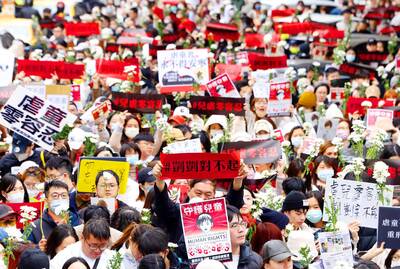About 54 percent of Taiwanese would still vote for President Tsai Ing-wen (蔡英文) if they were given the chance to recast their ballots in the Jan. 16 presidential election, with a similar percentage of people expressing satisfaction with her performance, according to a survey released by the Taiwan Style Foundation yesterday.
The telephone-based poll, conducted on Thursday and Friday last week among people aged 20 and above, sought to gauge the public’s evaluation of Tsai’s and Premier Lin Chuan’s (林全) performance as the Democratic Progressive Party (DPP) government is set to mark its 100th day in office.
Asked which of the three presidential candidates in the January race would they vote for if they were given a second chance, 53.8 percent of respondents chose Tsai, followed by 16.9 percent who favored former Chinese Nationalist Party (KMT) chairman Eric Chu (朱立倫) and 14.2 percent who supported People First Party Chairman James Soong (宋楚瑜).

Photo: Liu Hsin-de, Taipei Times
In the Jan. 16 election, Tsai garnered 56.1 percent of the votes, while Chu and Soong received 31 percent and 12.8 percent respectively.
Of those polled, 53 percent said they were content with Tsai’s performance, compared with 41.2 percent who thought otherwise, while the respondents seemed divided on Lin’s performance, with 44.5 percent approving of his work and 45 percent disapproving.
When asked to select one or more from a list of eight words or phrases that they believed best described Tsai, 72.7 percent of respondents chose “integrity.”
About 63 percent selected “trustworthy,” followed by “reformative” (57.8 percent), “leadership” (56.4 percent), “defender of Taiwanese interests when dealing with cross-strait affairs” (55.6 percent), and “bold and resolute in action” (48.9 percent), the survey showed.
As for what policies they believed the Tsai administration has put the most effort into over the past three months, 59.6 percent of those surveyed said it was pension reform, while others thought it was transitional justice (55.6 percent), labor rights (55.5 percent), judicial reform (51.3 percent) and the “new southbound policy” (49.7 percent).
Most respondents thought that maintaining cross-strait ties was the government’s least priority, with only 42.7 percent saying the matter had received Tsai’s top attention, the survey indicated.
Despite the recent drop in Tsai’s recent approval ratings, the poll found that as much as 61 percent still have confidence in Tsai’s future performance, while 33.1 percent said they did not have faith in the president.
About 55 percent said Tsai was steering Taiwan into the right direction, while 21.8 percent expressed an opposite opinion.
While 44 percent of respondents rated the DPP government better than the previous KMT administration, a cross-analysis showed that 40.4 percent of those identified as independent voters thought the two parties fared similarly.
The survey collected 1,071 valid samples. It has a confidence level of 95 percent and a margin of error of 2.99 percentage points.
DPP Legislator Lo Chih-cheng (羅致政) said the poll serves as an indicator that the public recognizes Tsai’s policy direction and her administration’s efforts in pushing for reforms.
“Nevertheless, the percentage difference between the number of respondents satisfied with Tsai’s performance and those who would still vote for Tsai suggests that the government’s pace of reforms might be lagging behind the public’s expectations,” Lo said.
DPP Legislator Chuang Jui-hsiung (莊瑞雄) said that while the Tsai administration has been dogged by “small hiccups,” that more than half of the respondents still found Tsai’s performance satisfactory shows that the president still enjoys support from a majority of the public.
However, it is apparent that people are expecting the government to roll out concrete achievements after 100 days in office, Chuang added.

Taiwan yesterday condemned the recent increase in Chinese coast guard-escorted fishing vessels operating illegally in waters around the Pratas Islands (Dongsha Islands, 東沙群島) in the South China Sea. Unusually large groupings of Chinese fishing vessels began to appear around the islands on Feb. 15, when at least six motherships and 29 smaller boats were sighted, the Coast Guard Administration (CGA) said in a news release. While CGA vessels were dispatched to expel the Chinese boats, Chinese coast guard ships trespassed into Taiwan’s restricted waters and unsuccessfully attempted to interfere, the CGA said. Due to the provocation, the CGA initiated an operation to increase

A crowd of over 200 people gathered outside the Taipei District Court as two sisters indicted for abusing a 1-year-old boy to death attended a preliminary hearing in the case yesterday afternoon. The crowd held up signs and chanted slogans calling for aggravated penalties in child abuse cases and asking for no bail and “capital punishment.” They also held white flowers in memory of the boy, nicknamed Kai Kai (剴剴), who was allegedly tortured to death by the sisters in December 2023. The boy died four months after being placed in full-time foster care with the

The Shanlan Express (山嵐號), or “Mountain Mist Express,” is scheduled to launch on April 19 as part of the centennial celebration of the inauguration of the Taitung Line. The tourism express train was renovated from the Taiwan Railway Corp’s EMU500 commuter trains. It has four carriages and a seating capacity of 60 passengers. Lion Travel is arranging railway tours for the express service. Several news outlets were invited to experience the pilot tour on the new express train service, which is to operate between Hualien Railway Station and Chihshang (池上) Railway Station in Taitung County. It would also be the first tourism service

‘MALIGN PURPOSE’: Governments around the world conduct espionage operations, but China’s is different, as its ultimate goal is annexation, a think tank head said Taiwan is facing a growing existential threat from its own people spying for China, experts said, as the government seeks to toughen measures to stop Beijing’s infiltration efforts and deter Taiwanese turncoats. While Beijing and Taipei have been spying on each other for years, experts said that espionage posed a bigger threat to Taiwan due to the risk of a Chinese attack. Taiwan’s intelligence agency said China used “diverse channels and tactics” to infiltrate the nation’s military, government agencies and pro-China organizations. The main targets were retired and active members of the military, persuaded by money, blackmail or pro-China ideology to steal